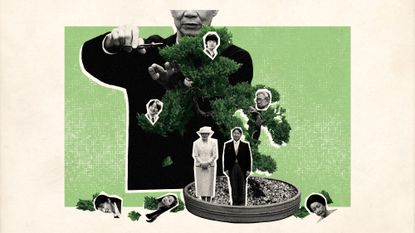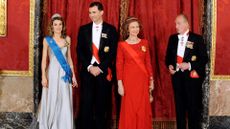Japan's succession drama puts future of world's oldest monarchy in doubt
Public feel 'sense of crisis' and politicians debate changing rules as Emperor has no male children and only three heirs

When Japan's Emperor Naruhito ascended the Chrysanthemum Throne in May 2019, after the abdication of his father, he vowed to bring the royal family into the modern age.
Five years later, the world's oldest continuing monarchy is grappling with a question as old as monarchy itself: succession. Under the Imperial Household Law of 1947, succession is limited to male heirs on the emperor's father's side (i.e. down the paternal line). Naruhito, the grandson of Japan's longest reigning emperor, Hirohito, has only a daughter with Empress Masako: 22-year-old Aiko, Princess Toshi.
According to a Kyodo News poll published this week, 72% of respondents said they felt a "sense of crisis" about the stability of the succession. And 90% would support the idea of a reigning empress, as the imperial family "struggles with a shrinking number of male heirs".
Subscribe to The Week
Escape your echo chamber. Get the facts behind the news, plus analysis from multiple perspectives.

Sign up for The Week's Free Newsletters
From our morning news briefing to a weekly Good News Newsletter, get the best of The Week delivered directly to your inbox.
From our morning news briefing to a weekly Good News Newsletter, get the best of The Week delivered directly to your inbox.
Emperor Naruhito's succession problem
Japan's imperial line, said to be able to trace its roots back to the sun goddess Amaterasu in 600BC, has included eight empresses down the patrilineal line, with the last on the throne in the 18th century.
But in all the nation's imperial history, there has never been a single emperor or empress from the matrilineal line, said Japan Today.
Naruhito only has three heirs: his younger brother and heir presumptive Fumihito, Crown Prince Akishino (58); his 17-year-old nephew Prince Hisahito; and his paternal uncle Prince Hitachi (88).
The birth of Aiko in 2001, while "much celebrated", did not resolve Naruhito's succession problem, said the BBC – especially because his brother Fumihito had only two daughters. However, it did lead the Japanese government to begin debating whether to change the law to allow women to ascend to the throne.
The issue appeared to be resolved in 2006, when Fumihito's wife gave birth to Prince Hisahito. But governments have since realised that "a single male heir is not a long-term solution", said DW.
The pressure on Naruhito's wife Masako also became evident, added the BBC, as she "disappeared from public view for more than a decade".
In 2021, a government panel tasked with ensuring stable succession shelved a decision on whether to make women (or matrilineal family members) eligible for the throne. The country is almost split by the decision, with 52% of respondents to the Kyodo News poll saying they agreed with the panel's postponement, while 46% said they disagreed.
The ruling party's 'shift' in position
The ruling Liberal Democratic Party (LDP) "appears to be inching toward changing the law to expand the imperial family and head off a succession crisis", said DW.
In January, the LDP "indicated a shift in its position", saying that the 2021 proposals are now "reasonable".
The first suggestion is to allow female members of the imperial family to retain royal status after they marry instead of becoming commoners who cannot produce male heirs (as is the current rule).
The second is to reinstate branches of the family that were "lopped off" after Japan's surrender at the end of the Second World War, as occupation officials aimed to "dramatically reduce" the emperor's influence.
Both proposals would give the family "a far larger pool of descendants" to the emperor, and a greater likelihood of a male heir.
The party's shift "appears to be a good sign, a sign that the LDP is finally listening to the opinion polls on the future of the imperial family", Hiromi Murakami, a professor of political science at the Tokyo campus of Temple University, told DW.
Representatives from across the political spectrum are set to meet in May to address the issue, but critics caution that conservative lawmakers "still intend to ensure that any new legislation does not open the way for a woman" to assume the throne.
"Both these plans are the result of machinations of conservatives opposed to female emperors," said Yohei Mori, a professor at Tokyo's Seijo University and imperial family researcher. These traditionalists have "lobbied hard" to persuade others in the LDP that the male lineage is Japanese "tradition".
By contrast, the Japanese public is "broadly in favour" of legal changes that would enlarge the family and allow a female or female lineage emperor, he said. After all, it is "unreasonable to limit the number of emperors to men in an age when gender equality is being called for".
Create an account with the same email registered to your subscription to unlock access.
Sign up for Today's Best Articles in your inbox
A free daily email with the biggest news stories of the day – and the best features from TheWeek.com
Harriet Marsden is a writer for The Week, mostly covering UK and global news and politics. Before joining the site, she was a freelance journalist for seven years, specialising in social affairs, gender equality and culture. She worked for The Guardian, The Times and The Independent, and regularly contributed articles to The Sunday Times, The Telegraph, The New Statesman, Tortoise Media and Metro, as well as appearing on BBC Radio London, Times Radio and “Woman’s Hour”. She has a master’s in international journalism from City University, London, and was awarded the "journalist-at-large" fellowship by the Local Trust charity in 2021.
-
 'You staring at me?'
'You staring at me?'Today's Newspapers A roundup of the headlines from the US front pages
By The Week Staff Published
-
 Has Bridgerton lost the plot?
Has Bridgerton lost the plot?Talking Point Return of the hit Regency series has divided both fans and critics
By Rebekah Evans, The Week UK Published
-
 The push to ban decaf coffee
The push to ban decaf coffeeUnder the radar Going caffeine-free can be risky
By Devika Rao, The Week US Published
-
 Modern royal scandals from around the world
Modern royal scandals from around the worldThe Explainer From Spain to the UAE, royal families have often been besieged by negative events
By Justin Klawans, The Week US Published
-
 French say coronation quiche is nothing but a ‘savoury tart’
French say coronation quiche is nothing but a ‘savoury tart’feature And other stories from the stranger side of life
By Chas Newkey-Burden Published
-
 Street without post for six months after dog bite
Street without post for six months after dog bitefeature And other stories from the stranger side of life
By Chas Newkey-Burden Published
-
 Will Australia become a republic?
Will Australia become a republic?Today's Big Question Central bank to remove royals from banknotes as government considers new referendum on cutting ties with the British monarchy
By Chas Newkey-Burden Published
-
 Naturist praises Prince Harry for outdoor romp
Naturist praises Prince Harry for outdoor rompfeature And other stories from the stranger side of life
By The Week Staff Published
-
 Kate Middleton gave Prince Harry a ‘savage’ Christmas present
Kate Middleton gave Prince Harry a ‘savage’ Christmas presentfeature And other stories from the stranger side of life
By The Week Staff Published
-
 Most Googled word of the year revealed
Most Googled word of the year revealedfeature And other stories from the stranger side of life
By The Week Staff Published
-
 Prince Andrew musical set for broadcast
Prince Andrew musical set for broadcastfeature And other stories from the stranger side of life
By The Week Staff Published